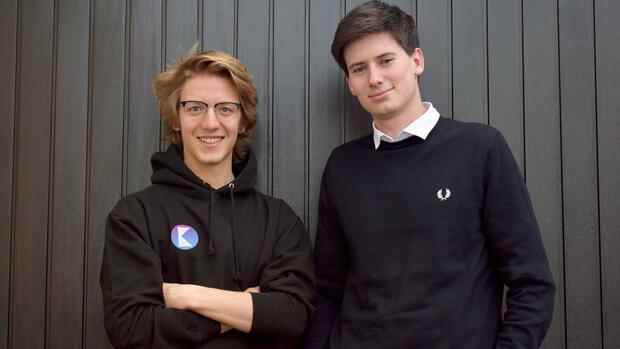How does Germany become a start-up country? The McKinsey experts call for better use of the potential of start-ups. Her thesis: If things continue as before, only around 2,900 start-ups would be founded in 2030. But if Germany were to turn five screws, it could be 5,800, i.e. twice as many, the consultants calculate in the new study “Entrepreneurship Zeitgeist 2030”.
The central lever for such a success: More people who would generally like to start a company must be encouraged to actually implement their project. Because, according to a representative survey of the consultants, only five percent of those willing to start a business dare to take the step into self-employment. “Other countries such as the Netherlands succeed in motivating a broader section of the population to start a business. Germany should use the opportunities of a more diverse structure even more, ”says McKinsey start-up expert and ex-StudiVz boss Markus Berger-de Leon.
The future federal government could set the course for more entrepreneurship. But start-ups only appear marginally in the exploratory paper of the traffic light coalition. “We will … promote innovation and create new confidence in entrepreneurship, innovation and entrepreneurship. To this end, we are strengthening the promotion of start-ups and founders and reducing the bureaucracy involved in promoting and financing innovation, ”says the three-party compromise. In concrete terms, instruments such as the KfW future fund, which has already been adopted, could help, believe the future coalitionists.
The previously unpublished McKinsey study sees five central target groups, based on its own calculation model and expert discussions, where start-up funding should start.
Top jobs of the day
Find the best jobs now and
be notified by email.
1. More spin-offs from universities and research institutions
1350 additional start-ups per year can be expected “through a more entrepreneurial mindset and teaching at universities, networking with the economy and improved commercialization of research performance,” the authors write. Last week, the University Innovation Challenge from Handelsblatt and Goethe University Frankfurt showed how this works.
The Hamburg research institutions are also investing with federal aid: a few weeks ago, DESY opened its own start-up center at the Deutsches Elektron-Synchrotron. “We can use Germany’s federal strengths by orchestrating local ecosystems from research, large and medium-sized companies as well as social institutions,” says co-author Tobias Henz from McKinsey. That already works well in Munich or at the RWTH in Aachen.
2. More funding for women
Better access to finance and networks as well as doubling the proportion of female founders to 32 percent enabled a further 630 start-ups every year, according to the calculation. The scene has long been discussing why so few women start a business. Several funds and initiatives aim to specifically support women. In the summer, 60 top managers formed the Encourage Ventures network to help founders with contacts and venture capital. “Role models are important,” says Henz.
3. More support for start-ups without academic training
The authors of the study believe that the proportion of founders without a university degree could be doubled to almost 40 percent. Then 520 more start-ups would emerge every year.
Success is even possible right after school, as the founders of the learning app Knowunity from Sindelfingen prove. The four friends received two million euros in venture capital from Project A and footballer Mario Götze in the spring.
Founded after training.
(Photo: Fastic)
The founders of the fasting app Fastic, Sebastian Wettcke and Phillip Wayman, who received five million euros from investors at the beginning of the year, founded the company after completing their training.
4. More trust in young founders
The average age of successful founders in Germany is 45 years. If more young people were to found a company, an additional 220 start-ups could be created every year. In addition: The particularly successful hypergrowth start-ups of recent years such as Delivery Hero, Personio or Flixmobility were all founded by people under 40.
5. Targeted support for founders with a migration background
Immigrants or their descendants want to set up a business more often than non-immigrants (59 percent and 49 percent, respectively). So far they have made up 20 percent of the founders. “If a more inclusive start-up ecosystem is achieved and the funding gap for founders with a migration background is closed, 180 additional start-ups will be possible annually in 2030,” the authors conclude.
Auto1 co-founder Hakan Koc could be a role model. He grew up as the son of Turkish immigrants in Kiel.
Co-founder of Auto1. The company evaluates and sells used cars.
(Photo: Dominik Butzmann for Handelsblatt)
Enes Seker is currently causing a sensation: The 26-year-old built up the donut chain Royal Donuts in no time at all and plans to look after 320 franchise stores by the end of the year. The son of Turkish immigrants managed with 10,000 euros of start-up capital for the first store in Cologne.
If the promotion of these five groups of founders is successful, the McKinsey experts expect strong effects: 41,000 start-ups are therefore possible by 2030. These new start-ups with 1.4 million employees would achieve a valuation of 2.3 trillion euros – 20 percent more than the Dax companies put together today.
Another prerequisite for this, however, is that fast-growing start-ups receive more money, especially in the late phase. At the same time, the new medium-sized companies, which create a particularly large number of jobs, should come more into focus. “In Germany, we should focus on our strengths, for example in terms of regional diversity and medium-sized businesses, instead of wanting to copy other locations,” advises Henz.
More: An interview with the President of the Technical University of Munich about spin-offs
